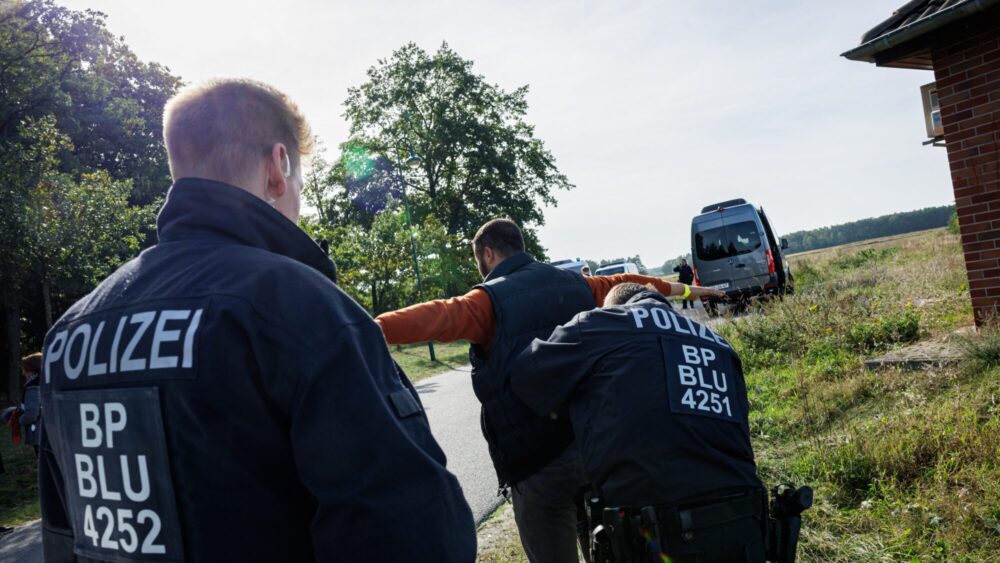Another display of diversity in Germany:

 www.dailymail.co.uk
www.dailymail.co.uk
Seriously, all of that because his wife left him?
Some portals report of 31 injured people, including 8 children.
As this portal stated:
Yeah, current government attempt of any kind of immigration control (and to win points in the elections) is too little too late:

 europeanconservative.com
europeanconservative.com

30 injured after machete-wielding attacker sets fire to homes
A Syrian suspect has been arrested following chaos in Germany, with fires tearing through two blocks of flats, leaving 30 people hurt, including eight children., in the city of Essen.
More than 30 injured after machete-wielding attacker sets fire to homes and rams van into shops in Germany: Syrian man, 41, is arrested
Published: 15:17 BST, 29 September 2024 | Updated: 21:32 BST, 29 September 2024
A Syrian suspect has been arrested following chaos in Germany, with fires tearing through two blocks of flats leaving 30 people hurt - including eight children.
Two of the children who were hurt are in a life-threatening condition after inhaling smoke, according to local media.
They were reportedly thrown from windows to escape the flames, landing on cushions placed on the street in the city of Essen.
Neighbours tried to reach up with ladders to help people escape, but they weren't long enough to reach the upper floors so brave residents worked together to lower children from the roof.
Footage posted on X shows a van ramming through two shops a short time after the fires in a rampage, allegedly targeting people connected to his wife who had left him.
The van caused damage but no injuries and a 41-year-old Syrian man was arrested at the scene on Saturday.
Seriously, all of that because his wife left him?
Some portals report of 31 injured people, including 8 children.
As this portal stated:
There has been a spate of knife attacks in Germany in recent months committed by mostly Syrian and Afghan migrants. Among the most tragic incidents was the brutal killing of three festivalgoers by a 26-year-old Syrian failed asylum seeker in Solingen in August, and the murder of a policeman by a 25-year-old Afghan failed asylum seeker in Mannheim in May.
With the anti-immigration AfD party constantly increasing its popularity, and registering its first regional electoral victory at the beginning of September, the left-liberal government has decided to react, reinstalling temporary border checks at all of Germany’s borders, and announcing new measures to deport failed asylum seekers. But the opposition AfD and the centre-right CDU think this is not enough, and that illegal migrants should be pushed back at the border.
Yeah, current government attempt of any kind of immigration control (and to win points in the elections) is too little too late:

Death of Schengen: Germany Reinstates Border Checks Amid Migration Surge
The plan has already led to a backlash from neighbors, while critics at home say it is too little too late.
Death of Schengen: Germany Reinstates Border Checks Amid Migration Surge
The German government has decided to implement temporary border checks on all of its land borders for the next six months in an attempt to curb illegal crossings into the country, the Interior Ministry announced on Monday, September 9th.
“We want to further reduce irregular migration. To this end, we are now taking further steps that go beyond the comprehensive measures currently in place,” Interior Minister Nancy Faeser said. She added that border checks are necessary until the EU’s external borders are sufficiently reinforced through joint action, although Brussels still lacks the legal framework for that.
According to Faeser, the measure is justified by the need to protect the country’s internal security from the “acute dangers posed by Islamist terror” and cross-border crime, as well as to alleviate the crushing “burden” on municipalities of having to accommodate and integrate too many asylum seekers.
Germany has already previously implemented similar measures along its borders with several neighboring countries, but the new move would extend border checks to all nine of its neighbors: Poland, Austria, France, Denmark, the Czech Republic, Switzerland, Belgium, Luxembourg, and the Netherlands.
The checks currently in place, which will soon expire, will also need to be extended for their periods to match the new ones, Faeser said. The leading members of the ruling ‘traffic light coalition’—Chancellor Scholz’s socialist SPD, the Greens, and the liberal FDP—are to meet later on Tuesday at the Ministry to discuss further details, but the plan is that the new checks will come into effect starting next week.
Despite the apparent necessity for the measures, the announcement immediately caused a backlash in Brussels and around Europe. Politicians slammed the decision for contributing to the ongoing, gradual breakdown of the EU’s borderless free movement area, the Schengen Zone, and said that the move would hurt border communities that depend on daily cross-border commutes.
“One of our most important freedoms is being jeopardized to send a political signal,” a liberal Dutch MEP from Renew said, advocating for external border protection instead—even though her party was also responsible for the lack of sufficient external protection measures in the EU’s new Migration Pact.
German opposition parties also regard the decision as a political move rather than a genuine effort, especially after the governing parties’ humiliating defeat in the recent regional elections in Saxony and Thuringia earlier this month and before the upcoming vote in Brandenburg in less than two weeks.
The staunchly anti-migration Alternative für Deutschland (AfD)—which won first place in Thuringia and ran the centrist CDU a close second in Saxony—reacted skeptically to the government taking a page out of its playbook after calling similar initiatives too extreme for months. “Oh, suddenly border controls? Wasn’t that ‘just Nazi?’” AfD co-president Alice Weidel replied to the news.
The CDU—the biggest opposition party, which has been riding anti-migration sentiment and calling for tougher border controls to stay ahead of AfD—voiced mild skepticism of the effectiveness of the plan, questioning whether it will actually involve turning back migrants after they have been caught crossing the border illegally.
“If the Federal Government wants us to go down this path together, then it will only work if we really do carry out comprehensive refoulement at Germany’s external borders,” CDU leader Frierdich Merz said.
However, Austria was quick to react saying that it would not accept any migrants if Germany tried to turn them back from its borders, foreshadowing an escalating diplomatic conflict between the two countries.



